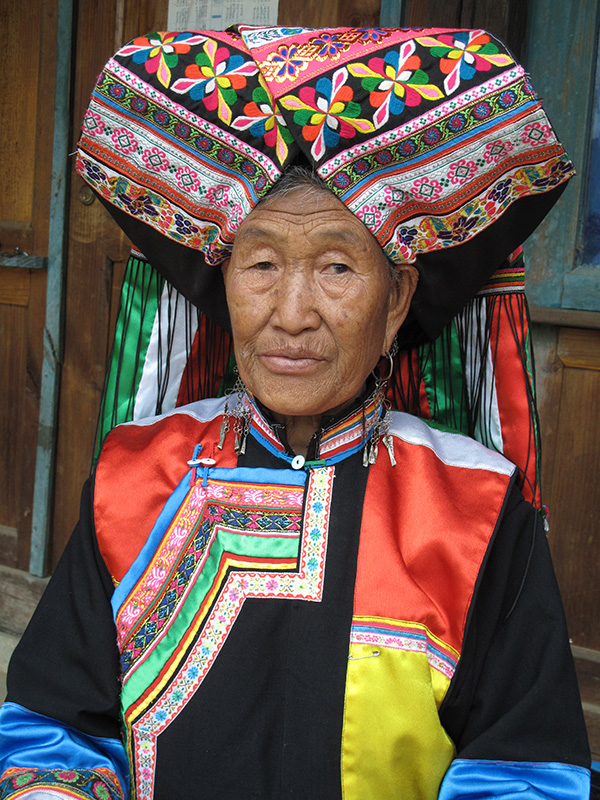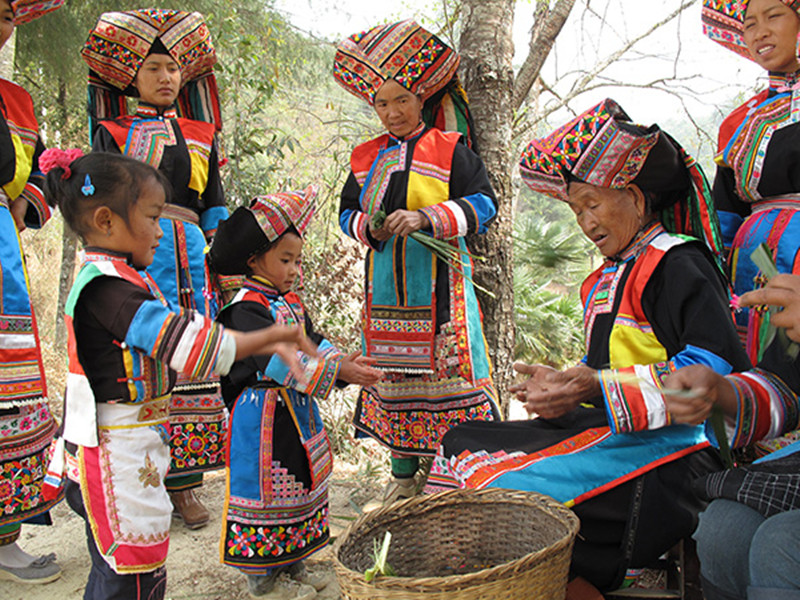Hu Yuxiu – Representative Inheritor of Lisu “Dudada” in Longling County, Baoshan
Personal Background
Name and Ethnicity: Hu Yuxiu (胡玉秀), born in 1939, is a folk artist of the Lisu ethnic group from Huanglianhe Village (黄连河村), Pingda Township (平达乡), Longling County (龙陵县), Baoshan City (保山市), Yunnan Province (云南省).
Family Situation: She has one son and four daughters. Her family’s livelihood relies primarily on farming, animal husbandry, and financial support from her youngest daughter.
Artistic Inheritance:
- Influenced by her grandmother Hu Datou (胡大头), she began learning how to make and play “Dudada” (嘟哒哒) from an early age.
- Over the years, she became the most skilled “Dudada” player among the local Lisu community and has committed herself to passing on this traditional art.


The Art of “Dudada”
Craftsmanship:
- “Dudada” (嘟哒哒) is a traditional sports game of the Lisu people, made by weaving square-shaped balls from pig bristle grass leaves, with a strip-shaped tassel at the top resembling a feather shuttlecock.
- Hu Yuxiu can craft “Dudada” in various sizes—large, medium, and small—and masters multiple styles of gameplay.
Gameplay Styles:
- Variants include solo play, two-person play, three-person play, and multiplayer formats.
- A modern version mimics volleyball, where teams hit the “Dudada” across a net, following strict rules (e.g., flat hitting or slapping the ball is not allowed).
Key Achievements
Competition Honors:
- In 2002, she publicly performed “Dudada” at the 7th Yunnan Minority Sports Games, winning second prize.
- In 2003, she performed at the 7th National Minority Sports Games and again received second prize.
Transmission Contributions:
- She has taught “Dudada” for many years, training a group of apprentices including her daughter and six core inheritors (ranging from 18 to 53 years old).
- Her efforts have inspired many local Lisu women to participate, forming a strong cultural inheritance network.
Social Impact
Hu Yuxiu’s work has helped “Dudada” evolve from a traditional ethnic game into a provincial-level intangible cultural heritage project. It has become a cultural emblem of Pingda Township (平达乡), Longling County (龙陵县).
During the 2025 Spring Festival cultural and tourism events, “Dudada” was showcased as a provincial-level heritage project and attracted a large number of visitors eager to experience it.
Cultural Background
Origin of “Dudada”:
- Legend says it was invented by Lisu sisters while harvesting pig bristle grass. Competitions are traditionally held in spring when wildflowers bloom.
- Intangible Cultural Heritage in Longling County:
- Pingda Township (平达乡) boasts 13 intangible heritage projects: 4 at the provincial level (including “Dudada”), 3 at the municipal level, and 6 at the county level.
- Huanglianhe Village (黄连河村) is a cultural hub for the Lisu people and home to several prominent inheritors, such as Yu Zhaodi (余照娣) for Lisu clothing and Yu Zongfu (余宗富) for Lisu mouth harp crafting.
Common Forms of “Dudada” Gameplay
Solo Play
Method: Played within a 2-square-meter area. The player tosses the “Dudada” upwards and uses one or both palms to tap it repeatedly to keep it in the air. If it touches the ground, the round ends.
Feature: Helps improve individual coordination and reaction time. Ideal for beginners learning basic skills.
Two-Person Play
Method: Two players stand 5 meters apart, facing each other. One throws the “Dudada” to the other, who must catch and return it using the palm(s). Missing the catch results in a loss.
Feature: Adds interactivity and competitiveness, requiring good timing and coordination.
Multiplayer Play
Method: Players split into two teams, arranged face to face, with unlimited team size—dozens or even hundreds. Teams stand 5 meters apart. One side throws the “Dudada,” and the other returns it. A team loses if anyone fails to catch it.
Feature: The large-scale nature creates a festive atmosphere. It enhances individual skills and tests team cooperation.
Net Play
Method: A modern version resembling volleyball, with a net in the center of the field. Players hit the “Dudada” over the net into the opposing team’s court. If the other team fails to catch it, a point is scored.
Feature: Incorporates volleyball rules, making “Dudada” more competitive and contemporary.
Traditional Folk Custom Format
Method: In folk traditions, “Dudada” also serves as a token of affection. Lisu girls carefully craft a “Dudada” and gift it to someone they admire. Through catching and tossing the ball, they express feelings.
Feature: Imbues the game with deep cultural and emotional significance, blending sport with ethnic heritage.
For Chinese version please go to:
http://www.ynich.cn/view-ml-13111-1848.html












